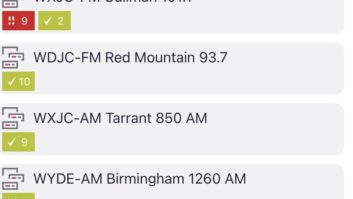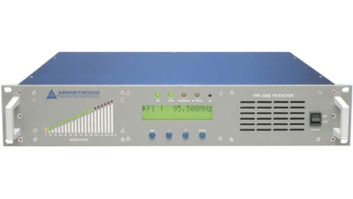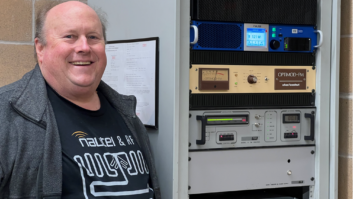
Tim Vik and the Nautel GV40BELLINGHAM, Wash. — Located off the northwestern corner of San Juan County, Wash., is Orcas Island, the largest of the San Juan Islands. Most of this beautiful, horseshoe-shaped island’s 57 square miles are rural and hilly. In April 2014, KWPZ(FM) installed the first Nautel GV40 transmitter on Mount Constitution, near the island’s highest point at 2,409 feet above Puget Sound. Playing a contemporary Christian format at 106.5 MHz, the station serves northwest Washington and Canada’s metro Vancouver, Victoria and the Fraser Valley.
Because the transmitter was the first GV40 built (serial number H0101), it was shipped to Orcas Island direct from the exhibition floor of the 2014 NAB Show. Station colleague Tim Vik and I spent a couple of 15-hour days unpacking and installing the transmitter. A lot of that time was spent getting to and from the transmitter site aboard a Washington State Ferry, part of the United States’ largest ferry system.
The transmitter certainly was packed with love; we could feel it as we tore the walls off the crate. The three-phase wiring that powered the previous transmitter was the correct size for powering the new GV40 and luckily turned out to be just long enough to reach the new transmitter.
Tim was impressed with the GV40 Advanced User Interface. Even though it was his first time playing with the AUI, he quickly figured out how to review alarms and set up presets. After wiring up the control and metering, connecting the 3-inch coax output, setting the IP numbers, and feeding AC to the UPS option that feeds the controller and exciter, the transmitter was ready to go.
Mount Constitution sites engineer Erling Manley commented on the improved layout changes of the GV40 compared to the NV20 (KAFE) and NV30 (KISM), located in a different facility on Mount Constitution. He said: “One thing we underestimated with the installation was the power needed to run the controller/exciter. When we first tried to turn on the transmitter it tripped the 1 kVa UPS unit that also powered an adjacent equipment rack, knocking the station off the air for a couple of minutes.”
He continued, “That’s when we discovered that the UPS option not only feeds the controller, but also the power supplies that power the two exciters (we ordered the standby exciter option), which can draw up to 14 amps when powering up the transmitter and 9 amps when running normally. Putting the transmitter on the air was delayed until we acquired a new Staco 2 kVa UPS, dedicated to the GV40. The exciter output can actually put out 500 watts of RF, feeding the output modules directly, eliminating the IPA normally found in transmitters. This accounted for the extra power needed to run it.”
I was surprised when I measured the three-phase amps feeding the transmitter running at 25.5 kW and it looked like the GV40 was drawing a good 20 amps less per phase at –14 dB than the previous transmitter running at –20 dB. It’s nice to put in a new transmitter, increase the HD Radio level, and actually see a reduction in power consumption. And we still have headroom if we should ever want to raise the HD level again.
We also found that the lowest power level we could set to minimize tower worker exposure was 4 kW FM+HD. We normally try to reduce power to 10 percent, 2.5 kW. Nautel is looking at a way for us to reduce power to a lower level.
We are still playing with AUI settings for “Power Boost” and “Optimizer” to see what trade-offs in reception we observe. So far, it looks like going with the “high efficiency” mode has little impact on my car radio when listening 65 miles from the transmitter site. I think we will be experimenting with this for a while longer.
There are a number of cool features in the AUI which we haven’t implemented, but are contemplating, like the ability to control other equipment with the extra GPIOs. Our present remote control is not set up for logging, and we’re considering using the “Call Home” feature that uses servers at Nautel to do the logging.
All in all, this transmitter is really cool. It’s a big step forward for KWPZ, and we’re confident, given Nautel’s reputation and experience with solid-state technology, that it will be more reliable than the previous transmitter. This GV40 transmitter is the seventh Nautel transmitter Crista Media has on the air with its four stations. We love these boxes.
For information, contact Wendell Lonergan at Nautel in Nova Scotia at (902) 823-5131 or visit www.nautel.com.











